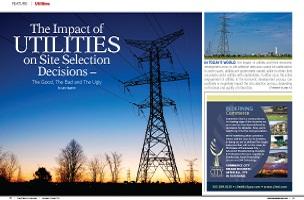
 In today’s world, the impact of utilities and their economic development arms on site selection decisions cannot be understated. In some cases, utilities are government owned, while in others they are private sector entities with shareholders. In either case, the active engagement of utilities in the economic development process can positively or negatively impact the site selection process, depending on the level and quality of interaction.
In today’s world, the impact of utilities and their economic development arms on site selection decisions cannot be understated. In some cases, utilities are government owned, while in others they are private sector entities with shareholders. In either case, the active engagement of utilities in the economic development process can positively or negatively impact the site selection process, depending on the level and quality of interaction.
Site selection firms and their clients must have a firm grasp on what is needed from utilities during all phases of a project, from initial research through delivery. Analysis is critical in order to understand capacity, cost and timing issues associated with the project. During the site selection process and prior to the launch of a new facility or building expansion, a key list of issues and requirements should be developed by the consulting firm and its client. The list of key criteria should then be weighted for purposes of analysis, in order for potential locations to be thoroughly vetted.
For example, if we are working on a food processing manufacturing project for a client, electric, natural gas, water and sewer infrastructure issues often have a material impact on project and on-going operating costs. For data center projects, electric, telecommunication and water utility issues are usually very important. For a cold storage warehouse facility, electric costs and reliability are critical factors in the site selection decision. Every project has its own nuances, so it is important to understand the unique aspects of the project in order to ensure a successful outcome.
What specifically should utilities focus on when working with site selection firms and their clients? Not unlike how economic development organizations work on project opportunities, professionalism, quality of information, responsiveness, speed and collaboration are all critical areas for utilities. Being able to address utility capacity, cost, timing and reliability issues demonstrates that a utility has its act together and is responsive to a company’s needs. At the end of the day, many utilities have the ability to provide adequate service to a company, but the ones that stand out are the entities that site selection firms and their clients have a high level of confidence in -- those who will deliver on what they commit to in support of a project.
The Good: We worked with a manufacturing client considering Midwest and Southeast regions of the United States for a new facility project. As a part of  this project, upgraded electric service was required to serve one of our top greenfield sites under consideration. Not only did the site require a significant amount of electric infrastructure, but our client’s electric consumption needs also drove the need to improve electric service in a larger geographic area of the community. The last thing we and our client wanted to see happen was for them to go to a site that met all of their electric utility requirements, but adversely impacted other businesses and homeowners in the area near the site. At the end of the day, what tipped the balance to one area was the commitment from the utility company to pay for a new substation, guarantee to have electric service in place by a specific date and make transmission line upgrades in the impacted area of the community. The utility company also committed to hitting a specific date, or it would pay our client a specific dollar amount for every day it missed the timeline. Not only did this level of commitment impress our client, but it created a high level of confidence that promises would be kept. Lesson Learned: Go the extra mile for a client if it makes sense for your business model, even though it may vary from normal policy. By demonstrating creativity and aggressiveness to win a project, you demonstrate a strong desire to win a deal – which, whether you are an individual or business, is meaningful.
this project, upgraded electric service was required to serve one of our top greenfield sites under consideration. Not only did the site require a significant amount of electric infrastructure, but our client’s electric consumption needs also drove the need to improve electric service in a larger geographic area of the community. The last thing we and our client wanted to see happen was for them to go to a site that met all of their electric utility requirements, but adversely impacted other businesses and homeowners in the area near the site. At the end of the day, what tipped the balance to one area was the commitment from the utility company to pay for a new substation, guarantee to have electric service in place by a specific date and make transmission line upgrades in the impacted area of the community. The utility company also committed to hitting a specific date, or it would pay our client a specific dollar amount for every day it missed the timeline. Not only did this level of commitment impress our client, but it created a high level of confidence that promises would be kept. Lesson Learned: Go the extra mile for a client if it makes sense for your business model, even though it may vary from normal policy. By demonstrating creativity and aggressiveness to win a project, you demonstrate a strong desire to win a deal – which, whether you are an individual or business, is meaningful.
The Bad: On a cold storage distribution center project for a client considering sites in the Mountain and Western areas of the country, we worked with an electric utility provider during the early stages of the process to review cost, capacity and service related issues impacting the site selection decision. The electric utility repeatedly provided us with information that was too general in nature and did not address our specific questions. This created a lot of unknowns that could not be quantified in our analysis for the client. Unfortunately, the story did not end there. The electric utility was also in the final stages of the process to secure approval from its state utility regulatory agency to increase electric rates and did not disclose that information to us. Through our own due diligence, we discovered the electric rate increase filing made by the utility, and also looked at the history of rate increases approved in the past for the utility to estimate what might happen to short and long-term rates. Lesson Learned: Always disclose all relevant information and provide direct responses to questions. It is much better to share “bad” news directly rather than letting a “customer” discover it on their own and lose confidence in a potential partner on a project.
 The Ugly: In support of a data center client for a project that examined sites in the Southwest and Mountain regions of the U.S., our firm and client worked with an electric utility on several issues related to service for a potential greenfield site. While the electric rate was very competitive for that region of the country, several issues related to timing, the costs of installing key electric infrastructure, and engineering/project fees being assessed by the utility stood out. During the site selection process, promises were made to our client regarding timing and cost issues. When it came time to execute, after our client made a decision to locate at a specific site, several previously undisclosed fees and delayed timing issues arose. We are not talking about small misses on timelines and negligible amounts of money. Delays were in months and fees were in the six figure dollar amount. Not only did this adversely impact our client’s project, it also created ill-will on both sides, which led to a damaged relationship. Lesson Learned: Only promise what you can deliver. Never “over sell” and “under deliver” for a client – you will be burned every time. By managing expectations appropriately, you will endear yourself to a client and create a long-term partnership.
The Ugly: In support of a data center client for a project that examined sites in the Southwest and Mountain regions of the U.S., our firm and client worked with an electric utility on several issues related to service for a potential greenfield site. While the electric rate was very competitive for that region of the country, several issues related to timing, the costs of installing key electric infrastructure, and engineering/project fees being assessed by the utility stood out. During the site selection process, promises were made to our client regarding timing and cost issues. When it came time to execute, after our client made a decision to locate at a specific site, several previously undisclosed fees and delayed timing issues arose. We are not talking about small misses on timelines and negligible amounts of money. Delays were in months and fees were in the six figure dollar amount. Not only did this adversely impact our client’s project, it also created ill-will on both sides, which led to a damaged relationship. Lesson Learned: Only promise what you can deliver. Never “over sell” and “under deliver” for a client – you will be burned every time. By managing expectations appropriately, you will endear yourself to a client and create a long-term partnership.
Key Considerations When Working With Utilities on Projects:
What is their track record when working on similar projects? Ask for references from their clients and chat with them about their experiences with
 the utility.
the utility.What is the utility’s history when seeking rate increases? Research the frequency, amount and justification for past rate increases.
Are you working with a multi-disciplined team of people or a “sales” person? Make sure you have engineering, customer relationship management and decision makers assigned to a team to ensure a successful outcome.
Is the utility interested in a long-term relationship with the company? Ask questions that help you understand what is driving their desire for your project – is it based on a desire to hit internal goals for adding load, to bring in new customers to diversify customer base, grow revenue and profit for the utility, etc.
Are they providing specific answers to questions or responding in generalities? Request detailed information from utilities to ensure you get specific answers – rosy platitudes will not arm you with the knowledge you need to make an informed decision.
Is the utility responding in a timely manner? When you ask for information, provide a reasonable amount of time for the utility to respond, but make sure they are accountable for answering in the set period of time – this provides you with insight into how serious they are about meeting deadlines.
In conclusion, know what you need from a utility company when you work with them on a project. It is only fair that they understand the parameters of the project, just as it is acceptable to hold them accountable for providing requested information within a specific period of time. Depending upon the type of assignment, utility companies can have a profound impact on the success or failure of a project. By managing the process correctly from the start, you can ensure the desired outcomes and create a long-term partnership.

